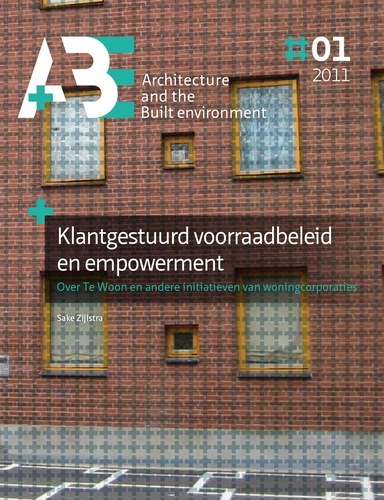Klantgestuurd voorraadbeleid en empowerment. Over Te Woon en andere initiatieven van woningcorporaties
Par :Formats :
Disponible dans votre compte client Decitre ou Furet du Nord dès validation de votre commande. Le format Multi-format est :
- Pour les liseuses autres que Vivlio, vous devez utiliser le logiciel Adobe Digital Edition. Non compatible avec la lecture sur les liseuses Kindle, Remarkable et Sony
 , qui est-ce ?
, qui est-ce ?Notre partenaire de plateforme de lecture numérique où vous retrouverez l'ensemble de vos ebooks gratuitement
Pour en savoir plus sur nos ebooks, consultez notre aide en ligne ici
- FormatMulti-format
- ISBN978-94-6186-002-6
- EAN9789461860026
- Date de parution02/03/2013
- Protection num.NC
- Infos supplémentairesMulti-format incluant ePub sans ...
- ÉditeurTU Delft
Résumé
Te Woon, offers the tenants the option to actively be a part of housing policy. The transfer of (property) rights and duties from the housing association to the tenant offers the opportunity to be in control over the dwelling.
Central to this dissertation are client driven housing management from housing associations in The Netherlands and the empowerment effects this management has on its tenants.
The central issue includes what client driven housing management is (definition), in which ways this can be devised, what the envisioned effects are and which effects this management successfully accomplishes. The provisions in the contracts, such as reduced price and shared risks, cater for more differentiated homes in the housing stock. The owner occupiers profit both directly considering authority and economical empowerment.
However, the contribution of Te Woon to energy and capacity empowerment remains diffuse. As a result, it is safe to conclude that the expectations are overexaggerated. The effects of Te Woon on, for example, the living quality in neighbourhoods are not tangible yet. Moreover, the tenants themselves have less high expectations.
The central issue includes what client driven housing management is (definition), in which ways this can be devised, what the envisioned effects are and which effects this management successfully accomplishes. The provisions in the contracts, such as reduced price and shared risks, cater for more differentiated homes in the housing stock. The owner occupiers profit both directly considering authority and economical empowerment.
However, the contribution of Te Woon to energy and capacity empowerment remains diffuse. As a result, it is safe to conclude that the expectations are overexaggerated. The effects of Te Woon on, for example, the living quality in neighbourhoods are not tangible yet. Moreover, the tenants themselves have less high expectations.
Te Woon, offers the tenants the option to actively be a part of housing policy. The transfer of (property) rights and duties from the housing association to the tenant offers the opportunity to be in control over the dwelling.
Central to this dissertation are client driven housing management from housing associations in The Netherlands and the empowerment effects this management has on its tenants.
The central issue includes what client driven housing management is (definition), in which ways this can be devised, what the envisioned effects are and which effects this management successfully accomplishes. The provisions in the contracts, such as reduced price and shared risks, cater for more differentiated homes in the housing stock. The owner occupiers profit both directly considering authority and economical empowerment.
However, the contribution of Te Woon to energy and capacity empowerment remains diffuse. As a result, it is safe to conclude that the expectations are overexaggerated. The effects of Te Woon on, for example, the living quality in neighbourhoods are not tangible yet. Moreover, the tenants themselves have less high expectations.
The central issue includes what client driven housing management is (definition), in which ways this can be devised, what the envisioned effects are and which effects this management successfully accomplishes. The provisions in the contracts, such as reduced price and shared risks, cater for more differentiated homes in the housing stock. The owner occupiers profit both directly considering authority and economical empowerment.
However, the contribution of Te Woon to energy and capacity empowerment remains diffuse. As a result, it is safe to conclude that the expectations are overexaggerated. The effects of Te Woon on, for example, the living quality in neighbourhoods are not tangible yet. Moreover, the tenants themselves have less high expectations.



